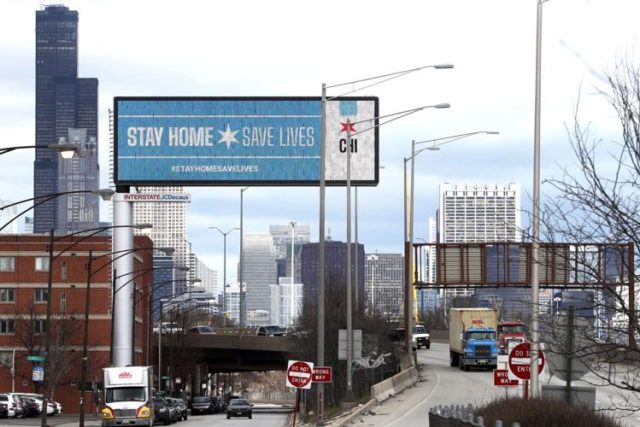
Editor: This isn’t a shocker. We said this would happen and no lives would be saved. But when you have Trump Derangement Syndrome, apparently some dont care.
(The Center Square) – An analysis from Johns Hopkins University found government restrictions intended to slow the spread of COVID-19 came with high economic and social costs and limited public health benefits.
“While this meta-analysis concludes that lockdowns have had little to no public health effects, they have imposed enormous economic and social costs where they have been adopted,” the authors of the study wrote. “In consequence, lockdown policies are ill-founded and should be rejected as a pandemic policy instrument.”
The analysis also found that “lockdowns have had little to no effect on COVID-19 mortality. More specifically, stringency index studies find that lockdowns in Europe and the United States only reduced COVID-19 mortality by 0.2% on average. [Shelter-in-place orders] were also ineffective, only reducing COVID-19 mortality by 2.9% on average. Specific NPI studies also find no broad-based evidence of noticeable effects on COVID-19 mortality,” according to the paper.
The analysis comes from the Johns Hopkins Institute for Applied Economics, Global Health, and the Study of Business Enterprise, which is led by Steve Hanke, a senior fellow and director of the Troubled Currencies Project at the Cato Institute. He previously served on President Ronald Reagan’s Council of Economic Advisers.
“Today, it remains an open question as to whether lockdowns have had a large, significant effect on COVID-19 mortality,” the authors wrote.
The study said compulsory nonpharmaceutical interventions had limited benefits. It defines lockdowns as any government mandate that restricts peoples’ possibilities.
“Our definition does not include governmental recommendations, governmental information campaigns, access to mass testing, voluntary social distancing, etc., but do include mandated interventions such as closing schools or businesses, mandated face masks, etc.,” wrote authors Jonas Herby, Lars Jonung and Hanke.
The working paper was not peer-reviewed. It counters other studies that concluded lockdowns did save lives, but it reaffirms a peer-reviewed study published in the European Journal of Clinical Investigation.
“In the early stages of a pandemic, before the arrival of vaccines and new treatments, a society can respond in two ways: mandated behavioral changes or voluntary behavioral changes. Our study fails to demonstrate significant positive effects of mandated behavioral changes (lockdowns),” the authors wrote. “This should draw our focus to the role of voluntary behavioral changes. Here, more research is needed to determine how voluntary behavioral changes can be supported. But it should be clear that one important role for government authorities is to provide information so that citizens can voluntarily respond to the pandemic in a way that mitigates their exposure.”
The analysis concluded: “The evidence fails to confirm that lockdowns have a significant effect in reducing COVID-19 mortality. The effect is little to none.”
“The use of lockdowns is a unique feature of the COVID-19 pandemic. Lockdowns have not been used to such a large extent during any of the pandemics of the past century. However, lockdowns during the initial phase of the COVID-19 pandemic have had devastating effects,” the authors wrote. “They have contributed to reducing economic activity, raising unemployment, reducing schooling, causing political unrest, contributing to domestic violence, and undermining liberal democracy. These costs to society must be compared to the benefits of lockdowns, which our meta-analysis has shown are marginal at best. Such a standard benefit-cost calculation leads to a strong conclusion: lockdowns should be rejected out of hand as a pandemic policy instrument.”
Dr. Roger Stark, senior fellow at Washington Policy Center’s Center for Health Care, said the analysis shows mandates have limited usefulness.
“Professor Hanke and his associates offer reasons that lockdowns are not effective,” he wrote. “For example, people most commonly respond to dangers through safe behaviors; mandates only regulate a small number of people’s actions; and lockdowns limit people’s access to safe outdoor spaces.”
“We do know that the draconian mandates of government have had dramatic adverse effects on the economy, the education of our children, and the mental well being of citizens,” Stark said. “Government officials should follow Professor Hanke’s research and first ‘do no harm.’ ”
Ted Dabrowski, president of Wirepoints, an independent nonprofit in Illinois, said the analysis comes as more and more people, including some Democratic governors, are reversing course on mandates.
“They couldn’t find anything that shows these interventions lead to lower mortality,” he said. “It calls into question all of these restrictions and mandates. They should be gotten rid of.”
California, Delaware, Hawaii, Illinois, Nevada, New Mexico, New York, Oregon and Washington require most people to wear masks in indoor public places as do Washington, D.C., and Puerto Rico. Connecticut has an indoor mask mandate for unvaccinated people.




